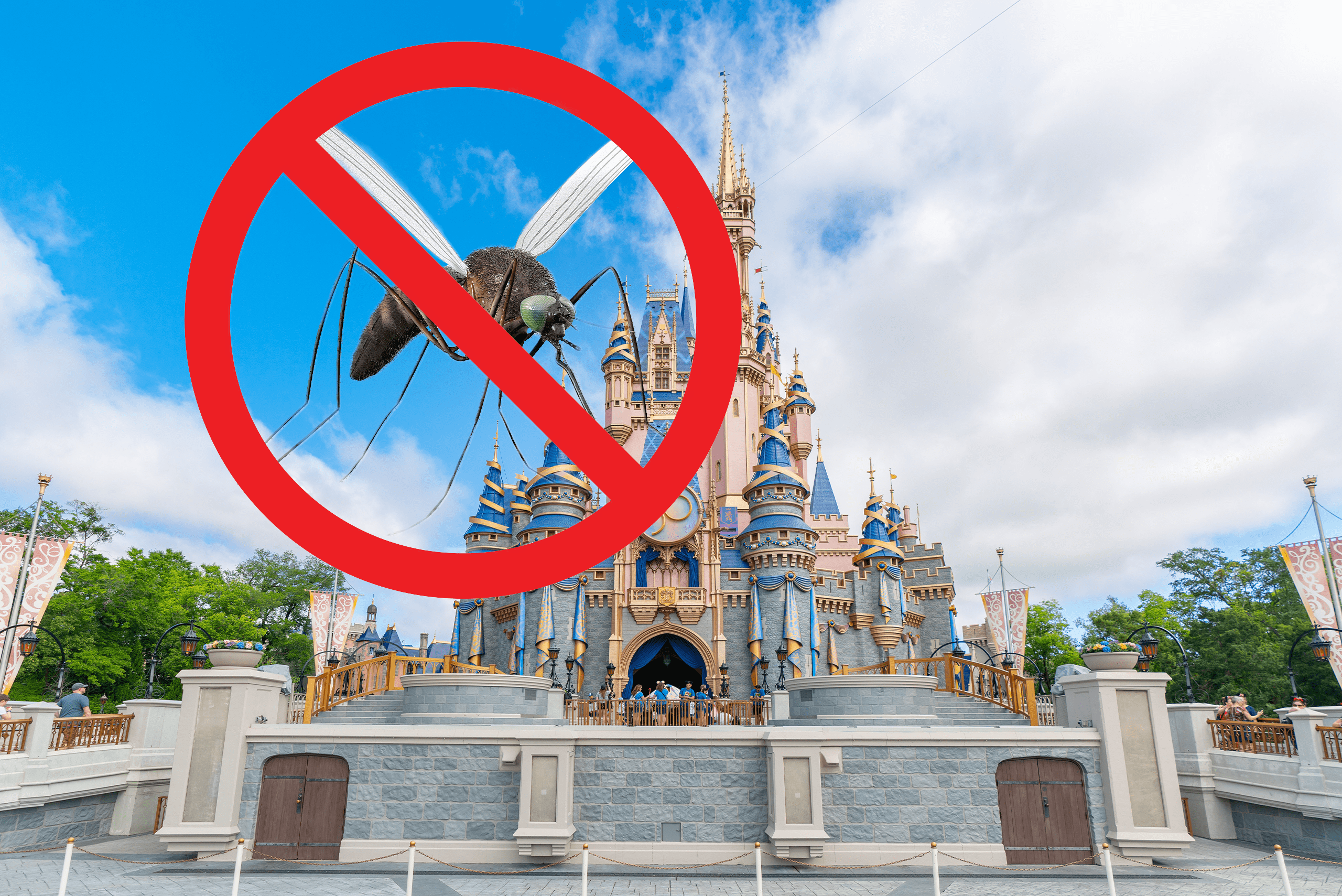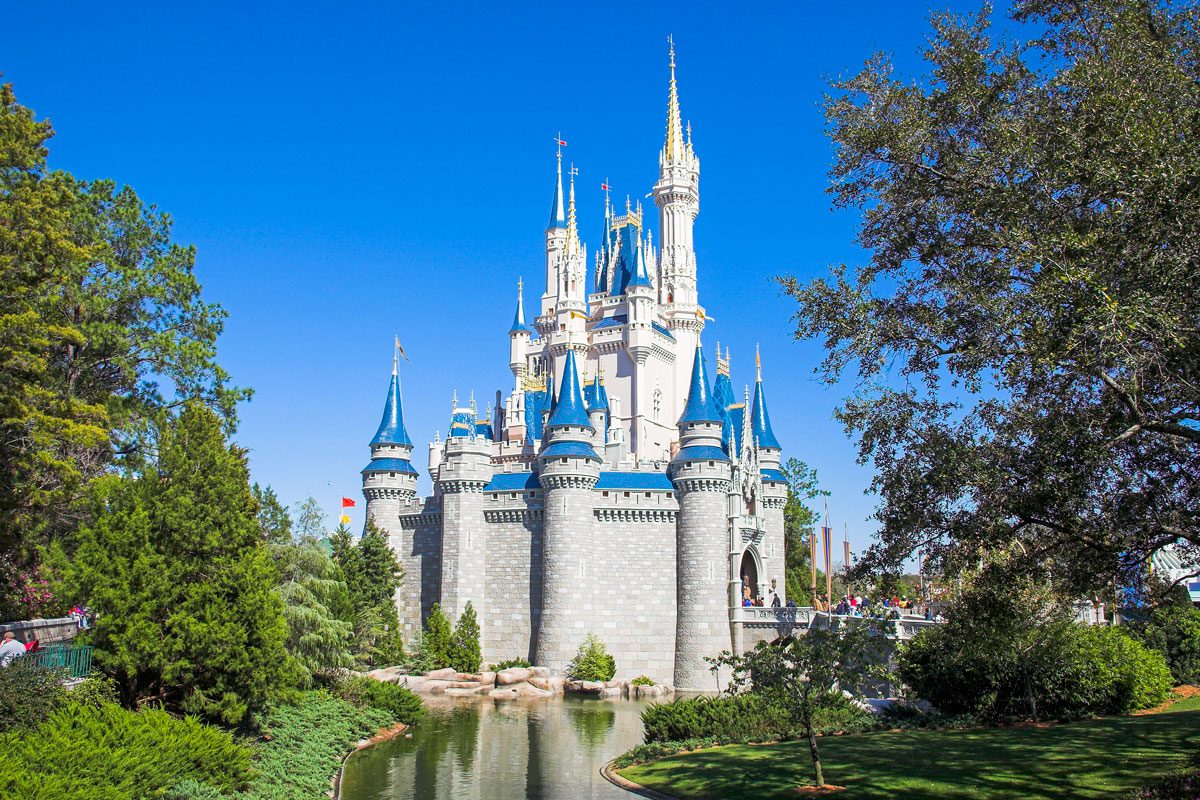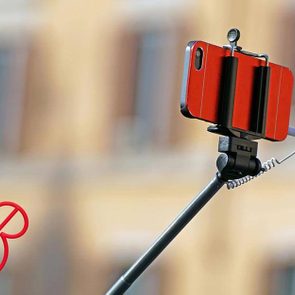Disney World mosquitoes are (almost) nonexistent. What kind of sorcery can keep mosquitoes away from a Florida theme park? The experts explain.

This Is Why You Rarely See Mosquitoes at Disney World

While you’re strolling around Disney World, deciding which attraction to check out next, you’re probably not swatting away mosquitoes. You might take it for granted; of course there aren’t swarms of pesky bloodsucking bugs in the Most Magical Place on Earth! But the fact you don’t find many Disney World mosquitoes—in an area of Florida that was previously swampland—is actually quite perplexing.
So why are there no mosquitoes in Disney World? It’s not a Disney secret, and there is no magic wand to completely eliminate all bugs. But by combining a few proven pest-control methods, Disney has managed to create a mostly mosquito-free park in the heart of swamp country.
“It’s an incredibly sophisticated and effective strategy,” says Brett Bennett, director of operations at Purcor Pest Solutions, “which is necessary, especially in an area like Florida that tends to provide the perfect environment for mosquitoes to thrive.”
Ahead, Bennett and other experts—including entomologists from Orkin and the National Pest Management Association, a Rutgers University professor specializing in mosquito control and a Disney expert—explain why you rarely see mosquitoes at Disney World.
Get Reader’s Digest’s Read Up newsletter for more Disney insights, humor, travel, tech and fun facts all week long.
Why are there (almost) no mosquitoes in Disney World?

Disney World uses a combination of effective, science-backed pest-control methods to keep mosquitoes at bay—and keep visitors safe. “Considering the downsides of having mosquitoes bite your guests, there’s a strong incentive for Disney to keep their grounds free of mosquitoes,” says professor Dina Fonseca, an expert in mosquito control and the chair of Rutgers University’s Department of Entomology.
Disney World mosquitoes wouldn’t just be an annoyance disrupting your ultimate Disney vacation; they could be carrying serious diseases. “Each mosquito species is capable of carrying a different suite of pathogens, such as dengue fever or West Nile virus [both of which can be found in Florida],” says Jim Fredericks, a board-certified entomologist and the senior vice president of public affairs at the National Pest Management Association.
These little insects sure can cause some big problems! So when Walt Disney was planning his theme park, he tapped former governor of the Panama Canal Zone and retired Army Maj. Gen. William “Joe” Potter for his comprehensive engineering, logistical planning and pest-control experience.
According to Christoper Lucas, author of Top Disney: 100 Top Ten Lists of the Best of Disney, Potter had developed extensive knowledge of pest control while battling swarms of malaria-carrying mosquitoes in the Panama Canal Zone during his time as governor in the 1950s. He went on to become executive vice president of the 1964–65 New York World’s Fair, and that’s where he met Disney. The man behind the magic “hired him on the spot,” Lucas says.
How does Disney keep mosquitoes away?
Disney uses a variety of methods to keep mosquitoes away, from architectural design to natural repellant. “Proactive mosquito prevention is key,” says Ian Williams, a board-certified entomologist at Orkin. “Fortunately, there are several strategies that help reduce mosquito populations effectively.”
While Disney goes above and beyond to make the park a magical place for (human!) guests, it aims to create an unwelcome environment for mosquitoes. “They’re essentially controlling and targeting Disney World mosquitoes at every stage of their lives, from egg to fully grown pest,” says Bennett.
In a state known for some of the worst mosquito activity in the country, Disney’s banishment of bugs is impressive. Here are some of the methods for keeping the park mosquito-free.
Flowing water
“Mosquitoes need stagnant water to lay their eggs,” Fredericks says. “You’ll notice a lot of fountains and moving water at theme parks like Disney. These make it difficult for mosquitoes to develop.”
Moving water was always part of the mosquito-free plan. When Potter got to work on construction for Disney World, Lucas says, he immediately set about building drainage ditches to remove the water and convert the swamplands to solid ground. And those ditches—nicknamed “Joe’s ditches”—are still used today.
Specialized architecture and maintenance
The experts say that Disney’s buildings were intentionally designed to prevent water from pooling. Have you ever noticed the shape of the buildings at Disney? “They made every building curved or designed in a way so there’d be no place for the water to catch and sit,” Lucas says. “The architecture is really appealing to the eye, but it also serves a purpose: It makes it less conducive to mosquitoes.”
Behind-the-scenes maintenance is also important. Fonseca says good sewage prevents the proliferation of the house mosquito, and Fredericks notes that Disney must also keep a watchful eye on gutters and catch basins to prevent stagnant water where mosquito larvae could develop.
Landscaping
Even the plants in and around Disney World are chosen to eliminate standing water. “Mosquitoes can develop in very small volumes of water, and some specialize in laying eggs in the water that pools in plants or dead portions of tree trunks,” Fredericks says. “Finding and removing dead limbs and selecting plants that don’t collect water is a must for preventing mosquito populations from developing.”
So while water lilies, for example, are pretty, you won’t find a single one at Disney World. The park avoids using any plants that provide hiding spots for mosquito larvae.
Predators
Don’t worry—Disney isn’t releasing the wild beasts from its Animal Kingdom park! But it does get some assistance in mosquito control from existing natural predators. “Disney uses fish in their water features and releases parasitic wasps to eat mosquitoes,” Bennett says.
Hold up. Do we (humans) now have to worry about parasitic wasps? Thankfully, there’s no cause for concern, and you can carry on enjoying your mosquito-free day at Disney. “The fish work together with the running water to keep mosquitoes from successfully spawning. And parasitic wasps might sound just as bad as mosquitoes, but they’re uninterested in bothering anything besides local pest populations, and their lifespan is so short they don’t cause a problem [for humans],” Bennett says.
Natural repellant
From the start, Walt Disney wanted to avoid contaminating the park with pesticides. “It’d be easy to just spray the whole thing,” Lucas says. “But he wanted something natural.” The solution? Liquid garlic. Mosquitoes despise this pungent plant, so Disney sprays an extract around the park. But you likely won’t notice it. “The amount they use is so small [that] humans can’t smell it, but mosquitoes are very susceptible to it,” Lucas says.
Although Disney goes to great lengths to keep mosquitoes out of the Most Magical Place on Earth, you may still encounter some pests, especially from March to October, when mosquitoes are most active in Florida. Williams suggests adding a bit of extra protection to yourself by using insect repellent and covering exposed skin with light, layered clothing.
Additional reporting by Meghan Jones.
About the experts
|
Why trust us
Reader’s Digest has published hundreds of travel stories that help readers explore the world safely, easily and affordably. We regularly cover topics such as the best places to visit (and the best times to visit them), tips and tricks to zoom through airport security, flight-attendant secrets, hotel-room hacks and more. We’re committed to producing high-quality content by writers with expertise and experience in their field in consultation with relevant, qualified experts. We rely on reputable primary sources, including government and professional organizations and academic institutions as well as our writers’ personal experiences where appropriate. We verify all facts and data, back them with credible sourcing and revisit them over time to ensure they remain accurate and up to date. For this piece on Disney World mosquitoes, Sunny Fitzgerald tapped her experience as a longtime travel writer and frequent traveler to ensure that all information is accurate and offers the best possible advice to readers. Read more about our team, our contributors and our editorial policies.
Sources:
- Brett Bennett, director of operations at Purcor Pest Solutions
- Ian Williams, board-certified entomologist at Orkin
- Jim Fredericks, board-certified entomologist and senior vice president of public affairs at the National Pest Management Association
- Dina Fonseca, professor, expert in mosquito control and chair of Rutgers University’s Department of Entomology
- Christoper Lucas, author of Top Disney: 100 Top Ten Lists of the Best of Disney
- Walt Disney Archives: “Joe Potter”
- Walt Disney World: “Disney Theme Parks & Water Parks – Frequently Asked Questions”
- Purcor: “2024 Worst Mosquito Cities in the U.S.”
- PestWorld: “What are the risks of mosquito bites?”
- The University of Florida Emerging Pathogens Institute: “Florida’s mosquitoes can make you sick: Here’s how to protect yourself”





















